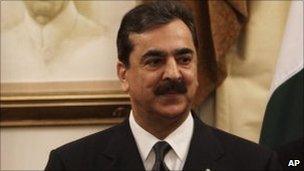Pakistan president holds 'crisis talks' with MQM
- Published

The MQM's power base in Karachi has been hit by ethnic and militant violence in recent months
The Pakistani president has met a senior member of the MQM party following its decision to withdraw two ministers from the federal cabinet.
President Asif Zardari met the governor of Sindh province, Dr Ishratul Ibad.
The meeting is part of the government's efforts to appease the MQM, a coalition partner which withdrew its ministers from the cabinet on Monday.
The Muttahida Qaumi Movement (MQM) said corruption and rising prices were the main reasons behind its decision.
It said it would decide soon whether to leave the coalition altogether.
If the MQM - which dominates the political scene in the city of Karachi - leaves the coalition, the Pakistan People's Party (PPP) government of PM Yusuf Raza Gilani will lose its majority in parliament.
But so far that looks unlikely to happen, because the MQM has insisted that it will not cross over to the opposition benches.
The BBC's M Ilyas Khan in Islamabad says that no party wants to be blamed for toppling an elected government in a country which has been marred by successive military takeovers.
Our correspondent says that some also feel that none of the smaller parties can topple the government without the support of the country's major opposition party, the PML-N, which does not seem to be in the mood to take the lead at this time of economic hardships and the challenge of militancy.
Extorting money
President Zardari arrived for crisis talks with Dr Ibad in Karachi from Naudero - the ancestral town of his wife Benazir Bhutto, who was killed in a militant attack three years ago.

Prime Minister Gilani now risks losing his majority in parliament
High on the agenda was the MQM's unhappiness over comments made in the Sindh parliament by PPP provincial Home Minster Zulfiqar Mirza.
Without naming the MQM, Mr Mirza said that people were extorting money and carrying out ethnic killings in Karachi - a city often blighted by militant and sectarian violence.
The MQM has threatened to quit the alliance altogether if Mr Mirza is not chastised.
But our correspondent says that is highly unlikely because such a move will spark further ethnic tensions in Karachi, capital of the Sindh province and the MQM's main support base.
It could also lead to police action against the MQM's militant wing which is widely believed to be behind most ethnic and political killings in the city over the last few years.
Pakistan's governing coalition currently holds 181 seats - including the MQM's 25 - in the 342-member parliament. This is just nine more than the 172 needed to preserve its majority.
Earlier this month, Jamiat-e-Ulema-e-Islam (JUI), a smaller coalition partner, withdrew from the government after a minister belonging to the party was sacked.
Mr Gilani's coalition faces a number of major challengers, including a growing Taliban insurgency.
- Published14 December 2010